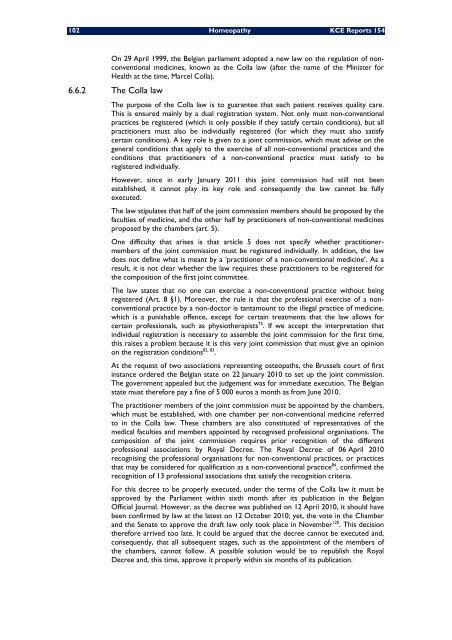Etat des lieux de l'homéopathie en Belgique - KCE
Etat des lieux de l'homéopathie en Belgique - KCE
Etat des lieux de l'homéopathie en Belgique - KCE
Create successful ePaper yourself
Turn your PDF publications into a flip-book with our unique Google optimized e-Paper software.
102 Homeopathy <strong>KCE</strong> Reports 154<br />
On 29 April 1999, the Belgian parliam<strong>en</strong>t adopted a new law on the regulation of nonconv<strong>en</strong>tional<br />
medicines, known as the Colla law (after the name of the Minister for<br />
Health at the time, Marcel Colla).<br />
6.6.2 The Colla law<br />
The purpose of the Colla law is to guarantee that each pati<strong>en</strong>t receives quality care.<br />
This is <strong>en</strong>sured mainly by a dual registration system. Not only must non-conv<strong>en</strong>tional<br />
practices be registered (which is only possible if they satisfy certain conditions), but all<br />
practitioners must also be individually registered (for which they must also satisfy<br />
certain conditions). A key role is giv<strong>en</strong> to a joint commission, which must advise on the<br />
g<strong>en</strong>eral conditions that apply to the exercise of all non-conv<strong>en</strong>tional practices and the<br />
conditions that practitioners of a non-conv<strong>en</strong>tional practice must satisfy to be<br />
registered individually.<br />
However, since in early January 2011 this joint commission had still not be<strong>en</strong><br />
established, it cannot play its key role and consequ<strong>en</strong>tly the law cannot be fully<br />
executed.<br />
The law stipulates that half of the joint commission members should be proposed by the<br />
faculties of medicine, and the other half by practitioners of non-conv<strong>en</strong>tional medicines<br />
proposed by the chambers (art. 5).<br />
One difficulty that arises is that article 5 does not specify whether practitionermembers<br />
of the joint commission must be registered individually. In addition, the law<br />
does not <strong>de</strong>fine what is meant by a ‘practitioner of a non-conv<strong>en</strong>tional medicine’. As a<br />
result, it is not clear whether the law requires these practitioners to be registered for<br />
the composition of the first joint committee.<br />
The law states that no one can exercise a non-conv<strong>en</strong>tional practice without being<br />
registered (Art. 8 §1). Moreover, the rule is that the professional exercise of a nonconv<strong>en</strong>tional<br />
practice by a non-doctor is tantamount to the illegal practice of medicine,<br />
which is a punishable off<strong>en</strong>ce, except for certain treatm<strong>en</strong>ts that the law allows for<br />
certain professionals, such as physiotherapists 75 . If we accept the interpretation that<br />
individual registration is necessary to assemble the joint commission for the first time,<br />
this raises a problem because it is this very joint commission that must give an opinion<br />
on the registration conditions 82, 83 .<br />
At the request of two associations repres<strong>en</strong>ting osteopaths, the Brussels court of first<br />
instance or<strong>de</strong>red the Belgian state on 22 January 2010 to set up the joint commission.<br />
The governm<strong>en</strong>t appealed but the judgem<strong>en</strong>t was for immediate execution. The Belgian<br />
state must therefore pay a fine of 5 000 euros a month as from June 2010.<br />
The practitioner members of the joint commission must be appointed by the chambers,<br />
which must be established, with one chamber per non-conv<strong>en</strong>tional medicine referred<br />
to in the Colla law. These chambers are also constituted of repres<strong>en</strong>tatives of the<br />
medical faculties and members appointed by recognised professional organisations. The<br />
composition of the joint commission requires prior recognition of the differ<strong>en</strong>t<br />
professional associations by Royal Decree. The Royal Decree of 06 April 2010<br />
recognising the professional organisations for non-conv<strong>en</strong>tional practices, or practices<br />
that may be consi<strong>de</strong>red for qualification as a non-conv<strong>en</strong>tional practice 84 , confirmed the<br />
recognition of 13 professional associations that satisfy the recognition criteria.<br />
For this <strong>de</strong>cree to be properly executed, un<strong>de</strong>r the terms of the Colla law it must be<br />
approved by the Parliam<strong>en</strong>t within sixth month after its publication in the Belgian<br />
Official Journal. However, as the <strong>de</strong>cree was published on 12 April 2010, it should have<br />
be<strong>en</strong> confirmed by law at the latest on 12 October 2010; yet, the vote in the Chamber<br />
and the S<strong>en</strong>ate to approve the draft law only took place in November 120 . This <strong>de</strong>cision<br />
therefore arrived too late. It could be argued that the <strong>de</strong>cree cannot be executed and,<br />
consequ<strong>en</strong>tly, that all subsequ<strong>en</strong>t stages, such as the appointm<strong>en</strong>t of the members of<br />
the chambers, cannot follow. A possible solution would be to republish the Royal<br />
Decree and, this time, approve it properly within six months of its publication.

















